 It’s always nice to see excellence rewarded commercially in anime – especially as it seems to happen so rarely. Mahoutsukai no Yome is excellent without a doubt, a stellar adaptation by Wit, and it garnered almost 6200 in Blu-ray volume sales in its first week. While those numbers don’t make it a monster hit, that’s a pretty healthy return for a series as thoughtful and relatively pander-free as this one. I’m not going to go so far as to say the production committee is being rewarded for risk-taking in this instance, as the Mahoutsukai manga is itself extremely popular, but they have at least had the good sense not to dumb it down to try and appeal to the anime audience.
It’s always nice to see excellence rewarded commercially in anime – especially as it seems to happen so rarely. Mahoutsukai no Yome is excellent without a doubt, a stellar adaptation by Wit, and it garnered almost 6200 in Blu-ray volume sales in its first week. While those numbers don’t make it a monster hit, that’s a pretty healthy return for a series as thoughtful and relatively pander-free as this one. I’m not going to go so far as to say the production committee is being rewarded for risk-taking in this instance, as the Mahoutsukai manga is itself extremely popular, but they have at least had the good sense not to dumb it down to try and appeal to the anime audience.
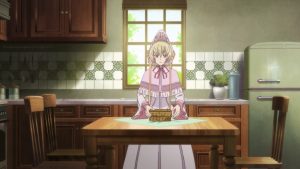 If it continues at its current pacing, the anime’s 24 episodes will likely use about 36 chapters from the manga – a manga which is currently only at about 42 chapters. So while The Ancient Magus’ Bride will almost surely get its anime sequel, it’s going to be a couple of years before we see it. These things can’t be rushed – and this is the sort of series that takes its time spinning its yarn. Exposition doesn’t happen in staccato bursts here, it’s slowly teased out over the course of multiple arcs – and that befits a story where the passage of long stretches of time is woven into the fabric of the narrative. The mysteries, large and small, sometimes feel as if they’re as old as time.
If it continues at its current pacing, the anime’s 24 episodes will likely use about 36 chapters from the manga – a manga which is currently only at about 42 chapters. So while The Ancient Magus’ Bride will almost surely get its anime sequel, it’s going to be a couple of years before we see it. These things can’t be rushed – and this is the sort of series that takes its time spinning its yarn. Exposition doesn’t happen in staccato bursts here, it’s slowly teased out over the course of multiple arcs – and that befits a story where the passage of long stretches of time is woven into the fabric of the narrative. The mysteries, large and small, sometimes feel as if they’re as old as time.
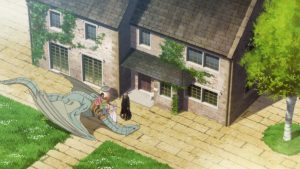 Like Togashi, Yamazaki-sensei likes to lay the thematic groundwork for the coming arc in the one before. We’ve seen Chise grow more and more impatient to learn more about Elias’ true nature, just as those around them have grown increasingly concerned with Chise’s growing complacency at being Elias’… Apprentice? Bride? Pet? Now we see Lindel summoning Chise through the person of his selkie familiar, Merituuli (Han Megumi – probably best not to imagine Hisoka and Gon here) – ostensibly to help her make her wand, but in part because he too is concerned about Chise’s attachment to his former apprentice.
Like Togashi, Yamazaki-sensei likes to lay the thematic groundwork for the coming arc in the one before. We’ve seen Chise grow more and more impatient to learn more about Elias’ true nature, just as those around them have grown increasingly concerned with Chise’s growing complacency at being Elias’… Apprentice? Bride? Pet? Now we see Lindel summoning Chise through the person of his selkie familiar, Merituuli (Han Megumi – probably best not to imagine Hisoka and Gon here) – ostensibly to help her make her wand, but in part because he too is concerned about Chise’s attachment to his former apprentice.
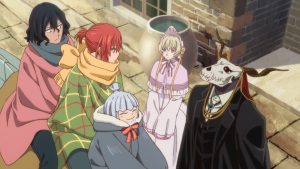 Killing two thematic birds with one stone, Lindel decides to tell Chise something about Elias – he’s rather stunned that he’s told her so little already, in fact. Chise would of course rather hear it from Elias herself, because in addition to knowledge she would be getting an acknowledgement that he’s come to trust her – but beggars can’t be choosers. As they huddle around a fire in the land of dragons, Lindel begins to spin the tale of how he came to know the being Chise knows as Elias Ainsworth.
Killing two thematic birds with one stone, Lindel decides to tell Chise something about Elias – he’s rather stunned that he’s told her so little already, in fact. Chise would of course rather hear it from Elias herself, because in addition to knowledge she would be getting an acknowledgement that he’s come to trust her – but beggars can’t be choosers. As they huddle around a fire in the land of dragons, Lindel begins to spin the tale of how he came to know the being Chise knows as Elias Ainsworth.
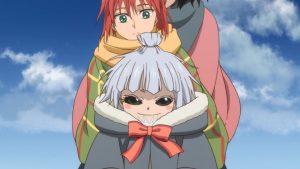 Lindel is himself a cagy sort, probably a function of having lived as long as he has and seen as much as he has. How long he’s not telling Chise, but a long time – longer than Elias anyway, and we know him to be centuries old himself. Lindel begins by telling Chise something of the existence of mages, beings whose origins and purpose are so mysterious as to be unknown even to themselves – born to normal humans but possessed of strange powers and often freakishly long lifespans, mages have been a part of the world’s fabric since there were people to tell stories about them.
Lindel is himself a cagy sort, probably a function of having lived as long as he has and seen as much as he has. How long he’s not telling Chise, but a long time – longer than Elias anyway, and we know him to be centuries old himself. Lindel begins by telling Chise something of the existence of mages, beings whose origins and purpose are so mysterious as to be unknown even to themselves – born to normal humans but possessed of strange powers and often freakishly long lifespans, mages have been a part of the world’s fabric since there were people to tell stories about them.
 As for Elias, he stumbled into Lindel’s camp at some point deep into the past, a frightening and huge creature, and collapsed from hunger. Lindel knows not what to make of it, and neither does the creature himself – his memories extend only as far as the beginning of the foot journey that brought him to Lindel. Bemused, Lindel decides to take the creature to meet his master, Rahab (Mitsuishi Kotono, about as iconic as they come), who’s likewise stumped – though she does name him Elias (she named Lindel too, naming things being one of her passions). Elias seems to these two mages to be a fairy, a creature of magic – but with a “hint of human” about him. At Rahab’s prompting Elias remembers one thing and one thing only – “Red”.
As for Elias, he stumbled into Lindel’s camp at some point deep into the past, a frightening and huge creature, and collapsed from hunger. Lindel knows not what to make of it, and neither does the creature himself – his memories extend only as far as the beginning of the foot journey that brought him to Lindel. Bemused, Lindel decides to take the creature to meet his master, Rahab (Mitsuishi Kotono, about as iconic as they come), who’s likewise stumped – though she does name him Elias (she named Lindel too, naming things being one of her passions). Elias seems to these two mages to be a fairy, a creature of magic – but with a “hint of human” about him. At Rahab’s prompting Elias remembers one thing and one thing only – “Red”.
 Answers are not what Mahoutsukai no Yome is about, not when it comes to these sorts of questions, not as this point in the story anyway. The mystery is what matters. What does seem clear is that more than simply taking Elias (who after his transformation to child-size begins to talk like a young boy, peppering his speech with “boku” and “kimi”) on as an “acquaintance” at Rahab’s order, Lindel feels something for him – the implication of his calling Chise “Granddaughter” is that Elias is his spiritual son. What we still don’t know is how far in this case the apple has fallen from the tree…
Answers are not what Mahoutsukai no Yome is about, not when it comes to these sorts of questions, not as this point in the story anyway. The mystery is what matters. What does seem clear is that more than simply taking Elias (who after his transformation to child-size begins to talk like a young boy, peppering his speech with “boku” and “kimi”) on as an “acquaintance” at Rahab’s order, Lindel feels something for him – the implication of his calling Chise “Granddaughter” is that Elias is his spiritual son. What we still don’t know is how far in this case the apple has fallen from the tree…


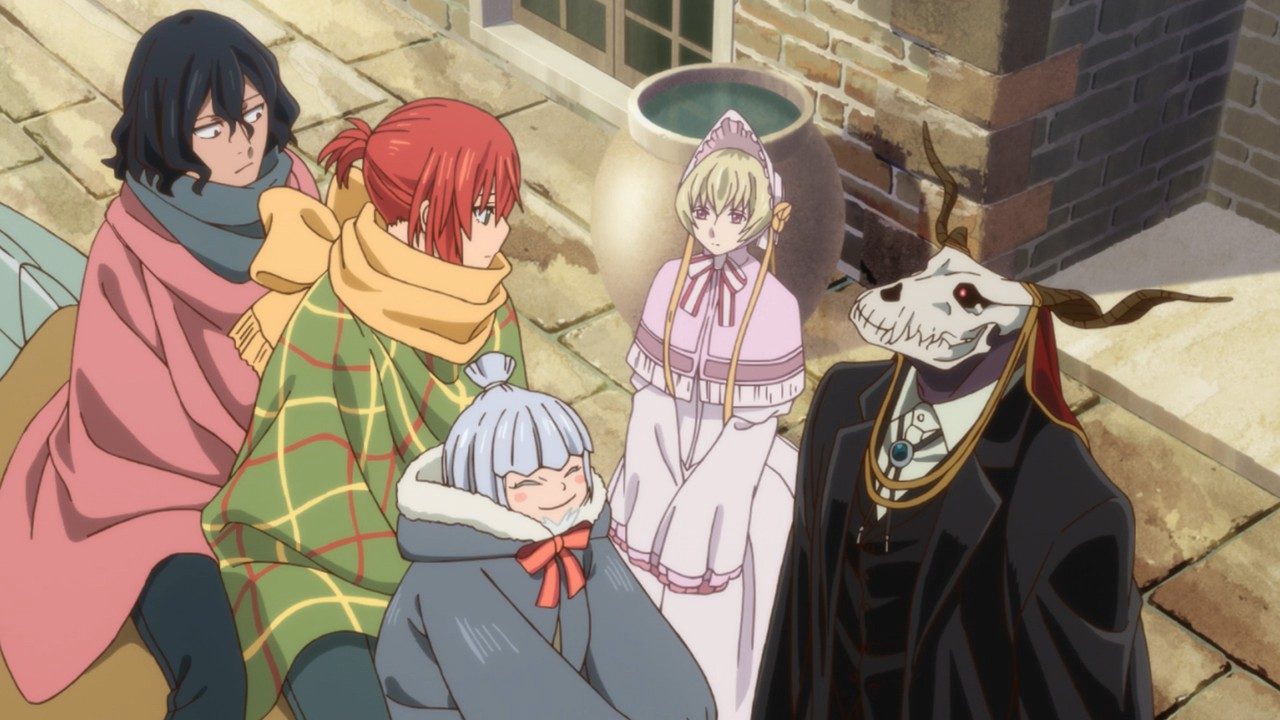
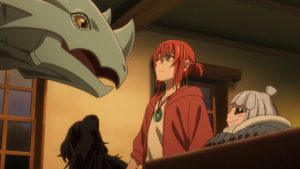
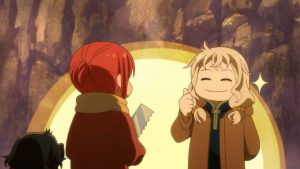

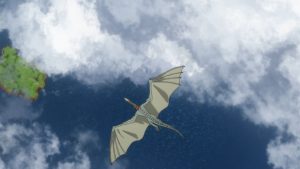
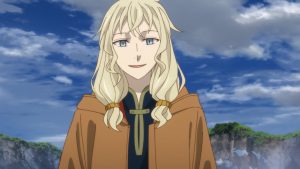

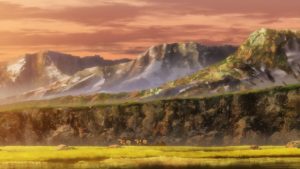
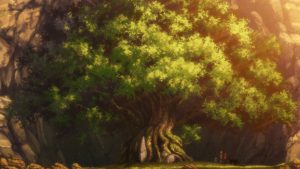
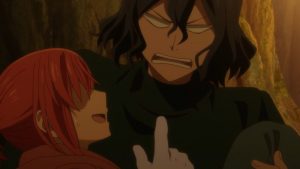

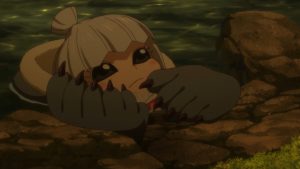
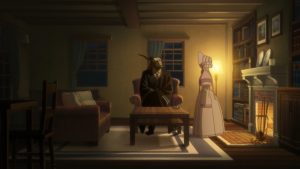
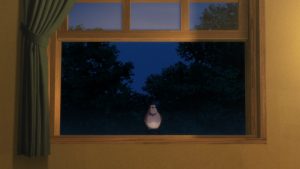
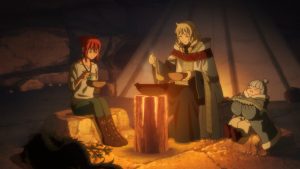
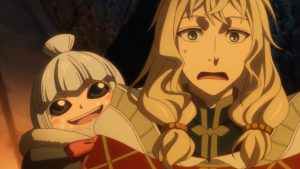


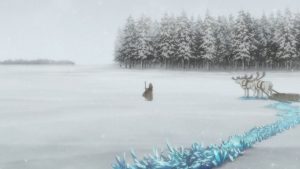
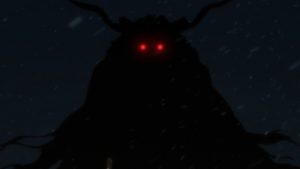


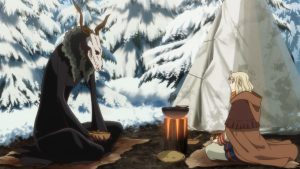
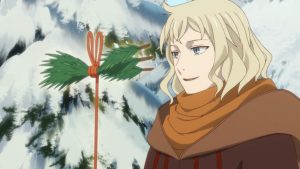




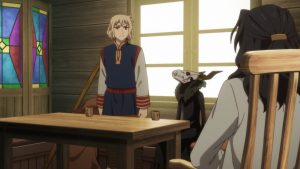
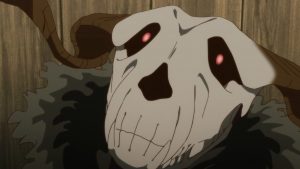

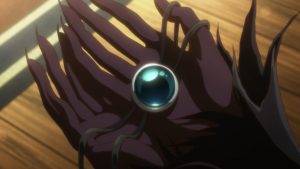
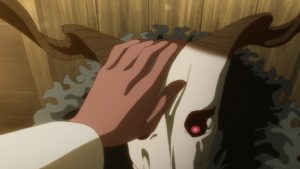


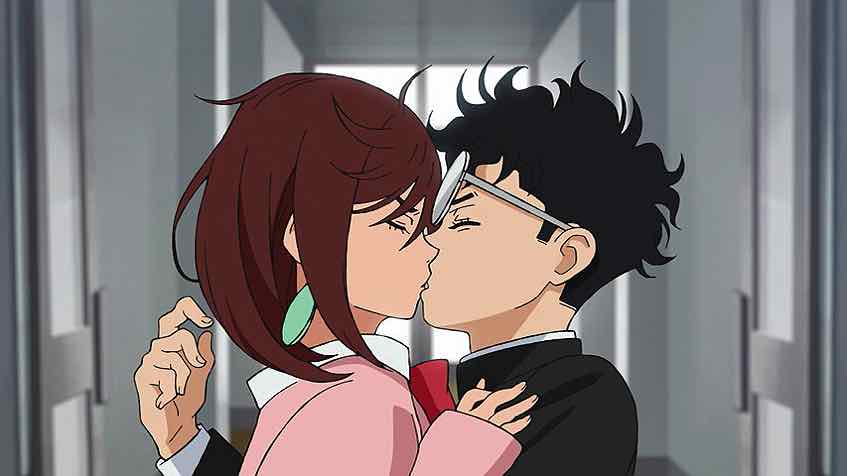
Kurik
December 10, 2017 at 12:24 pmThis is literally like a very good book. I can watch HunterxHunter levels of episodes of this show and probably never get bored and will constantly be looking forward to the next episode. Pity the manga doesn’t have more material. I will be in at same state as with Attack on Titan where I wanted more and ended reading it after the anime and then not so interested in the anime as I already knew what would happen. Hmmm…Will just enjoy the ride for now. Question – When Lindel went to visit his master she was wearing what i would consider ‘modern’ clothing and had stained glass windows – which period of time do you think this is? It had me scratching my head as it makes Elias age more a mystery.
Guardian Enzo
December 10, 2017 at 12:31 pmYes, I would agree that Rahab’s house and clothing looked fairly modern – probably no earlier than 19th Century. But while that doesn’t contradict the notion that both are hundreds of years older than that, it does conflict a bit with what we’ve been told about Elias’ age.
elianthos
December 10, 2017 at 6:06 pmI got the impression going by Lindel ‘s description of his sensei she has some kind of space-time manipulation skills…
the Sailor Cosmos of mages. She’ll rewrite your universe! //VA inside jokes:,)Guardian Enzo
December 10, 2017 at 9:41 pmYeah, that does seem possible.
Simone
December 11, 2017 at 1:31 pmMade me think of Merlin from Disney’s “Sword in the Stone” cartoon. She probably just came back from a vacation in Victorian England or something.